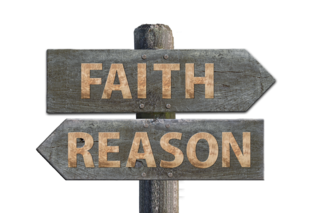Religion
Is Religious Faith Compatible With Scientific Thinking?
Integrating faith-based and evidence-based beliefs in a mentally-healthy way.
Posted November 14, 2023 Reviewed by Monica Vilhauer
Key points
- Faith is a normal process for dealing with uncertainty when answers to questions are lacking.
- Unlike scientific skepticism, denialism can often lead to non-evidence-based beliefs.
- Thinking scientifically is a learned skill rather than an innate trait.

A few years ago, a high school reader wrote in after reading my blogpost, "Flat Earthers: Belief, Skepticism, and Denialism" posing interesting questions about religious faith and denialism—that is, the refusal to acknowledge evidence or lack thereof, even when it's staring you in the face. In this blogpost, I'll revisit the discussion I had with him.
Religious Belief and Denialism
First, he asked whether those with strong religious beliefs were more prone to denialism. I answered as follows:
The tricky thing is that many of our beliefs are difficult, and sometimes impossible, to falsify. In other words, there are many unknowns that religious beliefs try to satisfy with answers. Is there a God? What happens when we die?
Faith—that is, choosing to believe something in the absence of evidence—is a normal process for dealing with uncertainty around those kinds of questions. In my opinion, there’s an optimal way to hold faith-based beliefs that acknowledges the possibility of being wrong and gives room for others to have different beliefs. We tend to get into trouble when we confuse faith with absolute truth and hold beliefs without cognitive flexibility. In my Flat Earth blogpost, I referred to H. H. Price’s distinction between “belief in” and “belief that.”1 As I mentioned, faith is a kind of “belief in.”
Based on this conceptual framework, religious faith doesn't have to involve denialism. Several Catholic Popes have argued that faith and reason can be compatible (I refer to Pope John Paul II's insightful comments on this in my blogpost, "The Death of Facts: The Emperor's New Epistemology"). But of course, that often isn’t the case, as with fundamentalists who insist on the literal meaning and truth of a religious text. So, to answer the question, it’s not religion per se that facilitates denialism so much as a rigid cognitive style that lies at one end of a continuum of cognitive flexibility and is epitomized in religious fundamentalism.
Ignoring the Truth
Next, the reader asked what happens to denialists when the evidence doesn't support their beliefs. How is it that they can turn a blind eye when truth stares them in the face?
I answered that confirmation bias—the tendency to ignore or reject evidence and opinion that contradicts what we believe, while gravitating towards evidence that supports it—is a universal trait that we all have (even scientists!) in various degrees. For those who hold their personal beliefs strongly, disregarding evidence—or arguing with people against it—is often the default. These days, many of us can feel this tendency within our online interactions.
It’s sometimes claimed that science and religion are but two faith-based philosophical approaches to knowledge. I don’t agree with that characterization—science is the antithesis of faith-based knowledge and is inherently designed to be open to the reformulation of theories based on new data. But it is true that most of us hold scientific beliefs based not so much on faith as on the trust of experts. In my opinion, mistrust or loss of trust is a major root cause of those who embrace conspiracy theories. Once scientific evidence and expert consensus is rejected, it can lead us down the “rabbit hole” of misinformation, especially on the internet. Similarly, loss of trust—more so I think than denialism—explains how one can come to abandon evidence and shift beliefs in a different direction.

Thinking Scientifically
Finally, the student asked if there was a fundamental difference in the way that religious believers and scientific minds think and whether the former was related to gullibility.
In response, I cautioned against splitting styles of belief and people in general into black and white dichotomies. After all, many people have religious beliefs and still think scientifically. Many famous scientists, from Galileo to Francis Collins, were avowed theists.
Still, it may be that scientific and religious modes of thinking depend on some innate preferences (e.g. one might be genetically predisposed to prefer faith-based or evidence-based beliefs) that, in turn, influence what we believe. For example, it has been shown that religiosity can predict belief in some conspiracy theories that contradict scientific consensus.2 Similar work has found that conspiracy thinking is related to “teleologic thinking,” defined as the attribution of purpose and causes to natural events or entities, as well as “need for certainty” and a relative lack of analytical thinking.3,4
In my view however, a preference for how we develop beliefs is much better explained by how we’re taught as we grow up in the world, rather than there being any significant innate differences. “Scientific thinking”—that is, arriving at knowledge through experimentation and the scientific method—is not how we innately come to believe things. Rather, it’s a deliberate method that humans have devised to steer us away from the natural cognitive biases that often lead us to embrace false beliefs.
Science is grounded in a particular form of skepticism that holds that beliefs should be based on repeated observation and experimental controls—that is, evidence. As a result, when there’s no evidence, as with many religious questions, science tends to be either agnostic or nihilistic, which is not always appropriate (e.g., absence of evidence is not always evidence of absence, especially when research to test a hypothesis hasn’t been conducted). Note, however, that this kind of skepticism isn't the same as denialism. Denialism involves the rejection of evidence, which rather than leading to nihilism, often results in a tenacious conviction of non-evidence-based beliefs.
Thinking scientifically requires learning this method throughout one’s life. That happens in science class in elementary school and beyond, but needs to be reinforced outside of the classroom. Science class isn’t going to “stick” if it’s refuted within the broader culture or subculture that we live in. Within subcultures, there are many beliefs that may be idiosyncratic to the rest of the world that are reified within our in-group. When our group and individual identities are based on those same beliefs, it tends to bolster our conviction around those beliefs and, often, the need to defend them. Ironically, when we come to believe that giving up our beliefs threatens our very identity, that’s often when those beliefs can be the most destructive.
References
1. Price HH. Belief ‘in’ and belief ‘that.” Religious Studies 1965; 1:5-27.
2. Landrum AR, Olshansky A. The role of conspiracy mentality in denial of science and susceptibility to viral deception about science. Politics and the Life Sciences, 2019; 38:193-209.
3. Wagner-Egger P, Delouvée S, Gauvrit N, Dieguez S. Creationism and conspiracism share a common teleologic bias. Current Biology 2018; 28:R867-R868.
4. Swami V, Voracek M, Stieger S, Tran US, Furnham A. Analytic thinking reduces belief in conspiracy theories. Cognition 2014; 133, 572-585.




